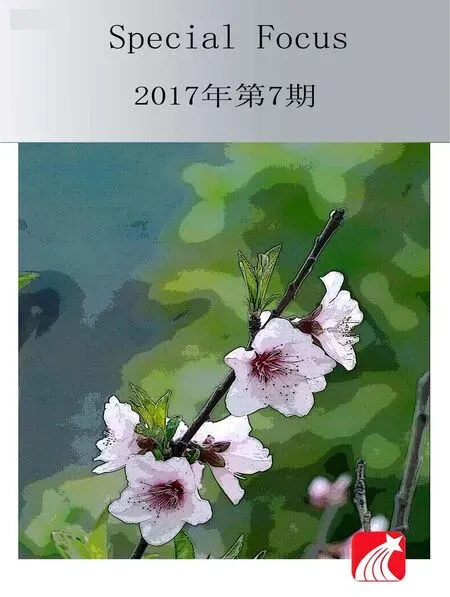The Wife’s Pillow
2017-08-03ByHuoQi
By Huo Qi
The Wife’s Pillow
By Huo Qi
Zuo Zongtang came from a poor family and could not afford a decent marriage when he was 20, an age at which most men already had a wife and kids. He married Yiduan of the Zhou family, a renowned and rich family in Xiangtan (a town in Hunan Province, middle south China). Miss Zhou Yiduan received a good education from her mother and was known to be a talented poet, as well as beautiful Lady. In a traditional Chinese marriage, the wife will leave her parents’family and join her husband’s; however, because of the conspicuous gap between Zuo’s and his wife’s families, Zuo had to leave his family and became a member of Zhou family.
As a married man Zuo tried to earn his official rank and riches through passing the Keju (the imperial examination system). Unfortunately, he failed to pass the metropolitan examination (the national class). After that he had to earn a living by teaching. Later he worked as a private tutor of a governor’s son for eight years. During these years being a teacher, Zuo left his beloved wife at home to travel from one place to another, feeling increasingly depressed at his unfulfilled expectations.
Yiduan knew well about her husband’s pain and loneliness. She was worried that Zuo would feel hopeless and give up, or that he might end up visiting prostitutes or using drugs. In one of their few meetings in 1835, before Zuo went to the imperial capital to take the metropolitan exam once again, Yiduan made a pillow for him and embroidered on it a pattern of “a Fishing Village in the Afterglow.” It took Yiduan three days and three nights to finish the work. In the pattern there was a fishing boat fastened beside the willow, and across the fogged green river the tree-covered mountains could be seen in the distance. The wife also embroidered one of her own poems beside the pattern:
Fastened in emerald mist are the boat and his net. This is the evening scene of home, my lord.
Do know in the hazy dreams I wait for you;
And do let this landscape touch your heart’s chord.
“My lord,” Yiduan said gently, “whenever you see the pillow in your journey, please think of me. It will represent my love and accompany you to all the faraway places you go.”
Zuo took the pillow with him in his travels. On every lonely night in the unfamiliar land, during moments of nostalgia and insomnia, he touched the pillow, silently read Yiduan’s affectionate poem, and felt that she was right there with him. Thus within the cuddling warmth his fretful mind was soothed, and he fell into a peaceful sleep.
Sadly, Zuo failed to pass the metropolitan exam in 1835 for the second time, and then in 1838 for the third time.
The man was plunged into the depths of despair. He swore that he would forget his ambition and think no more than being a peasant. Desperately, he burned his collection of books, and also threw the pillow into the fire.
Y i d u a n saw this and ordered the servants to rescue the books. She put herself in danger by getting the pillow out of the fire. The pillow was partly burnt, and Yiduan burst into tears.
“You did this to break my heart,” she said to her husband, “but I still have faith in you. You will be somebody one day.”
With his wife’s comfort and encouragement, Zuo regained confidence. He then concentrated on practical studies such as politics, agriculture, hydrology, military strategies, and western sciences. Whenever he became inactive, he saw the pillow (already mended anew by Yiduan) and felt refreshed.
An opportunity finally emerged. In 1852, the troops of the “Taiping Rebellion” besieged Changsha, the capital of Hunan Province. Under such crisis, the governor of Hunan, Zhang Liangji, asked Zuo to lead the army in the city. Zuo did his best all day and all night to arrange the defense. After three months of siege the city wall still stood; and the rebellion force retreated to the north.
That was the beginning of Zuo’s brilliant career. Thereafter he led the imperial army to defeat the Taiping Rebellion, and then the “Nian Rebellion.” He re-conquered the lost land of Xinjiang. He was also a leading figure in “the Westernization Movement.” His official rank reached the first class when he became “The Grand Secretary of Dongge” at the age of 61. He had real power in the empire.
In 1870, when Zuo was commanding a campaign, he received a message that said Yiduan had passed away at home. The mighty general shed bitter tears in anguish. He held his wife’s pillow in arms and said,
“The wailing bird is separated from his mate. Only this pillow will accompany me in the rest of my days.”
(From Folk Legends, Issue 12, 2016. Translated: Wang Xiaoke.)


晚清名臣左宗棠,从小家境贫寒,到了20岁时还讨不到老婆。周家是湘潭名门望族,家道殷实。周家小姐周诒端才貌双全,自幼随母读书作诗,是小有名气的女诗人。左宗棠入赘周家,成了“倒插门”女婿。
左宗棠结婚后,参加会试,但名落孙山。
左宗棠只得设帐授徒,当上了教书先生,靠学生家长奉送的酬金为生。后给两江总督的儿子当私塾先生,一干就是八年。这期间,左宗棠和妻子聚少离多。
常年在外奔波颠沛,加上寄人篱下的生活,让心性高傲的左宗棠异常苦闷。
常言道,知夫莫过妻。夫人周诒端深知左宗棠怀才不遇、孤寂冷清,又担心丈夫自暴自弃,眠花宿柳或吸食鸦片,她想给夫君精神上慰藉。
1835年,左宗棠赴京参加会试前夕,周诒端亲手为他缝制一只枕头,并一针一线在枕头上绣了幅《渔村夕照图》,画面为一叶轻舟,系在杨柳之下,远山笼翠,碧水含烟。在这幽雅画面边,周诒端又绣上自写的一首小诗:“小网轻舟系绿烟,潇湘暮景个中传。君如乡梦依稀候,应喜家山在眼前。”
周诒端花了三天三夜的时间,终于缝绣好“渔村夕照枕”。
左宗棠临行前,她深情款款地将枕送到左宗棠手里,说:“老爷,见枕如见妾,枕在妾在。他乡寂寞的夜晚,枕着它,如妾伴在你梦中。”
后来,左宗棠每逢外出,必带“渔村夕照枕”在身边。客居异乡,孤枕寒衾,乡愁潮涌,难以入睡之时,他就在心中默念浪漫多情的枕上诗,犹如爱妻就在身旁,既温馨又幸福,浮躁的心绪慢慢平静下来,心中的烦恼也渐渐烟消云散,酣然入睡。
夫人周诒端那充满乡情、亲情、爱情的“渔村夕照枕”,成为左宗棠客居异乡的安眠药。
1838年,第三次会试不第归来,左宗棠处于人生的最低谷,发誓终生不问世事,安心做个湘上农人。
他将所有的藏书付之一炬,气急之中,也将“渔村夕照枕”扔到火中。
周诒端忙指挥家人抢救书本,更不顾自身危险,亲自从熊熊大火中抢出枕头。枕头已烧了一个大洞,周诒端抱着破枕大哭,对左宗棠说:“老爷连枕头都烧了,那是在剜妾的心,妾坚信夫君不会‘渔樵了此生’。”
后来,左宗棠用心深钻方舆、农桑、水利、军事、洋务等经世之学,偶有疏懒,一见周诒端缝补如新的“渔村夕照枕”,便重振信心。
周诒端也全掬一心,抚慰夫忧,安慰他,鼓励他,激发左宗棠的雄心。
左宗棠终于等来出头的机会。
1852年,太平天国大军围攻长沙,省城危在旦夕,左宗棠应湖南巡抚张亮基之聘出山,受托执掌长沙城全部军事。左宗棠不分白天黑夜地辛勤操劳,使太平军围攻长沙三月不下,撤围北去。
左宗棠一生的功名也就从此开始,他先后平定太平天国,镇压捻军,兴办洋务,收复新疆。在61岁那年,左宗棠官至东阁大学士,成为权倾一时的清末名臣。
1870年,左宗棠在军营中指挥作战时,接到夫人周诒端在长沙病逝的消息,左宗棠悲痛异常,这位驰骋疆场、威风八面的英雄,抱着“渔村夕照枕”潸然泪下说:“‘珍禽双飞失其俪,绕树悲鸣凄以厉’,从此只有此枕伴我了。”
(摘自《民间传奇故事》 2016年第12期)
渔村夕照枕
文|霍琪

